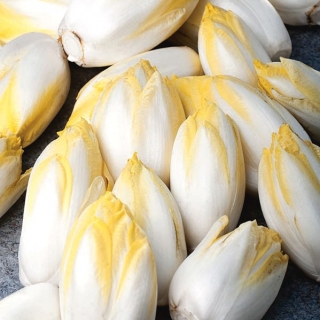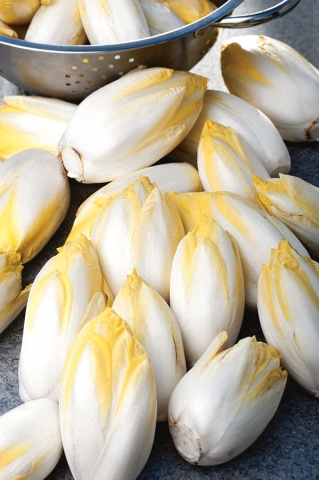The "Mechelse Middelvroeg" Belgian endive is a variety that will supply you with plenty of shapely and tasty heads. This chicory relative is forced from the roots harvested in autumn. The oblong, cob-shaped heads are white-yellow and consists of firm, crunchy leaves. Their taste is slightly bitter. This leaf vegetable is valued for its high nutritional value, especially useful in winter. Belgian endives are usually consumed raw as addition to sandwiches or as a salad ingredient. They can be used for preparation of delicious, original snacks and dish garnishing. They contain a glycoside called lactucopicrin (intybin) that is known as an appetite stimulant and regulates digestive processes.
Belgian endive is a biennial plant. From the seeds sown in the first year grow dense leaf rosettes. A large conical tap root grows underground. It is then used to grow heads in forced cultures. The sow takes place end of May and at the beginning of June, in shallow grooves 30-40 cm apart. The vegetable presented here requires humus, well-drained soil. Watering is necessary at the germination stage. It is also advisable to weed and loose the soil and fertilize it with multi-component mineral fertilizer.
Roots for forcing are harvested from September to the late autumn months. After the harvest they are stored in basements and dugouts so that they are not exposed to frost, nor high humidity. They lie flat in the sand until they are used. In order to grow heads, the roots are placed vertically in the ground at a place where a temperature between 10-25ºC can be maintained and that is completely dark. You can also cover the seedlings with foil or non-woven fabric, leaving just enough space for them to germinate. The soil must be constantly moist. The whole process takes about 4 weeks. The oblong heads are cut just above the ground with a thin layer of root so that the leaves do not fall off.
One package contains 0.2 g of the "Mechelse Middelvroeg" Belgian endive seeds. Detailed growing instructions and the sow-by date were printed on the package.
- Weight: 0.2 g
- Use: direct consumption
- Harvest time: Roots - autumn; heads - all year long from forced cultures
- Growth form: oblong, cob-shaped heads
- Vegetation form: biennial
- Foliage: Yellow-white leaves
- Site: humous, well-drained, weeded, loosened soil
GardenSeedsMarket - has been in business for more than a decade and from the very beginning we have made the quality of our products the top priority. Throughout the years we have delivered the best quality goods to tens of thousands of customers from all over the world. Their satisfaction proves that we had chosen the right way.
All seeds we sell are subject to a multi-level quality control checks and only then are carefully packed and dispatched. Our products have been awarded numerous certificates and comply with the highest standards of the European Union. Our employees are experienced gardeners who are more than happy to answer your every question.
Where do our seeds come from?
All of the seeds sold in our shop come from the best producers from across the European Union. Thanks to a long-standing cooperation with them we were able to develop the most adequate storing and dispatch conditions, guaranteeing that you always receive fresh and carefully tested batches of seeds. Exclusion of the middlemen from the whole process not only makes it possible for us to avoid sending out-of-date seeds that might have been lying too long on a warehouse shelf, but also ensures the most attractive price for top quality products.
The quality control process
All our seeds must pass a four-stage quality control process.
Stage one begins with a careful selection of the suppliers. Than we proceed with controlling their crops, foreign producers are not excluded from the quality control process. Plants are checked at every stage of their development: when they start to grow, during blooming and when they start bearing fruit (seeds). At this stage the most important thing is to ensure proper spacing of the plants. Thanks to that obtaining the desired morphological characteristics of each particular species or variety, such as colour, height and shape, can be ensured.
Stage two consists of a detailed verification tests in laboratory conditions. With the use of the highest quality equipment by the highly qualified staff, our suppliers perform more than 30 000 quality checks annually. The seeds that do not meet our requirements are subject to technological refining processes, including drying, cleaning, upgrading and testing again.
Stage three starts with sowing seeds in selected control plots. That way we obtain valuable, exact information concerning their germination that must be maintained at an appropriate level. Simultaneously, the varietal identity of each species is checked at this stage.
Stage four takes place in our warehouses and consists of eliminating seeds that have been stored for too long on our shelves and replacing them with new batches. Each package is stamped with a unique batch number and also with the sow-by-date.
All four stages combined allow us to state with confidence that the seeds we deliver comply with the highest standards and have completed all required control stages with flying colours.
Prizes and awards
The seeds we sell are widely recognized for their quality and have won many awards. Our seeds won numerous gold medals and distinctions for their high quality. The World of Flowers was also honoured for its innovative approach.
Among those awards there were: TOP INNOVATION (June 2015), GOLD MEDAL AT THE POZNAN INTERNATIONAL FAIR (2015), CONSUMER QUALITY LEADER (2014), FARMER OF THE YEAR (2014).
In addition, we have also been awarded the “IDEAL BUSINESS” certificate for two years in a row.
Germination
We are committed to selling only the highest quality seeds. Taking into consideration the efforts we make daily, please also note that plants are living organisms and their germination and growth depends on many factors, such as temperature, soil type, humidity and the frequency with that they are watered, sowing time and conditions, use of fertilizers and plant protection agents (pesticides), as well as weather and climate conditions. We provide help by sharing the accurate and up-to-date sowing and growing information, however, we cannot bear any responsibility for the plants that were not cultivated in conditions appropriate for given species.







